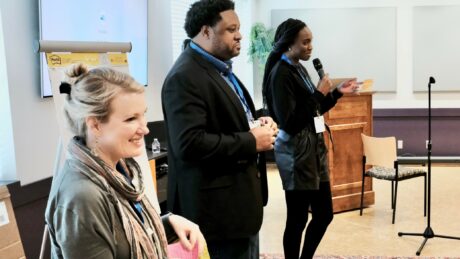
As part of a nine-month process, congregational teams from St. Julian of Norwich, Round Rock and Good Shepherd, Austin are joining together in the EHF Racial Justice Incubator Cohort. The cohort will focus on developing strategies and approaches to ministry that effectively respond to the recurring social issues brought about by racism, injustice, and inequity. The cohort is also addressing ways that these issues intersect with issues of gender, sexual identity, and social class.
The cohort strives to build and strengthen the ability for clergy and lay leaders to take on robust social/theological analysis of social issues and include community collaboration to reach more equitable and just realities for all.
Led by Project Curate, the church leaders are being exposed to an innovative learning and network-building process designed to assist them and their churches in understanding the ever changing social-cultural contexts, build trust with communities of color, and contribute to the common good.
“Our hope is that in the coming years St. Julian’s can transition from a mode of learning and political advocacy to forming significant relationships with communities of color in Central Texas, a move from learning/advocacy to friendship, shared ministry, and mutual growth and flourishing,” said the Rev. Miles Brandon, rector of St. Julian of Norwich. “We want to take our public advocacy and political work to further support and follow voices of color at all levels of government.”
As part of this cohort, the teams will be reaching out to the community to begin to build relationships and trust with communities of color as part of their work.
“It is our hope that, within the next five years, we would continue to provide our congregation with a series of entry points through which people can learn and grow in our capacity to engage in thoughtful discussions about race and racism,” said the Rev. Channing Smith, rector of Good Shepherd in Austin. “We want to develop a strong and growing network of relationships with organizations and communities within the city, the region and the diocese focused on racial healing and that we become a community that can be relied on by communities of color as friends and family working toward joyful union with God and with one another.”